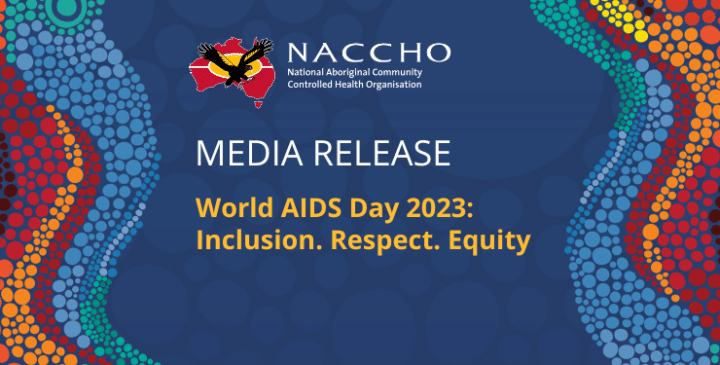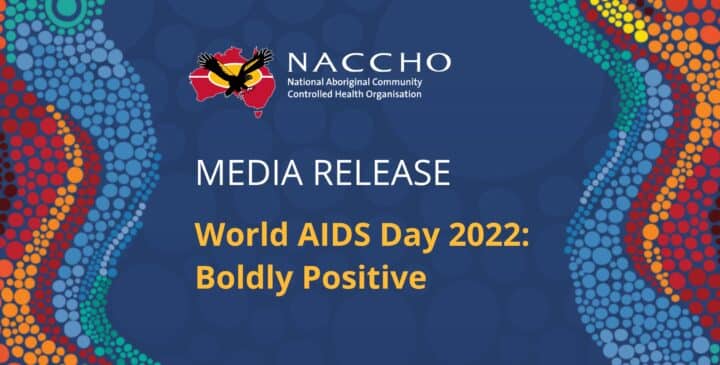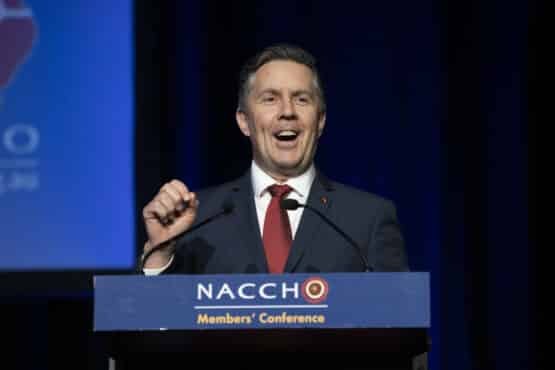

Aboriginal and Torres Strait Islander Advisory Group on COVID-19, 17 August 2020
The Aboriginal and Torres Strait Islander Advisory Group on COVID-19 (the Taskforce) was convened in March 2020, to co-design the Management Plan for Aboriginal and Torres Strait Islander Populations on COVID-19 (the Management Plan) to protect communities and save lives. It also advises on health issues related to COVID-19. The Taskforce is co-chaired by the National Aboriginal Community Controlled Health Organisation (NACCHO) and the Australian Government Department of Health.
Taskforce members include Aboriginal and Torres Strait Islander health sector representatives and state and territory governments. With the assistance of NACCHO, this has provided an essential national expertise and coordination role throughout the COVID-19 pandemic. The Taskforce ensures emerging and pressing issues are addressed when required. The Taskforce also has a key role in sharing information across jurisdictions about COVID-19 planning and preparedness. These updates, involving representatives from the state/territory government and the Aboriginal and Torres Strait Islander Health sector have ensured shared learnings and have been critical to the flow of information to the sector. This expertise has been critical to the response planning, policy development and implementation of the primary care response for Aboriginal and Torres Strait Islander Australians.
This communique provides an update on the work of the Taskforce and current key areas of focus.
Current status of coronavirus
Unfortunately, over the last month the number of COVID-19 cases reported in Aboriginal and Torres Strait Islander peoples has increased. In total up to 17 August 2020 there have been were 131 cases. In the last 20 days, 31 cases have been reported. Most of the cases, 25, were in Victoria. There were also four cases in New South Wales and two in the Northern Territory.
Victoria is facing a very challenging situation and with pockets of outbreaks in New South Wales and Queensland it is a reminder that the COVID-19 situation can change quickly. Everyone needs to follow the rules in their region, particularly around border restrictions and use of face masks. People should wear masks where required and when it is difficult to social distance yourself from other people (at least two big steps and no big groups), and download the COVIDSafe App. Please limit travel if possible. Everyone has a role to play to protect communities. This means: washing hands, with soap and water where possible for at least 20 seconds or using hand sanitiser. If you feel sick you should stay home. Contact your local health clinic to get tested if you have and get tested for any cough, sore throat, fever or other COVID-19 symptoms.
The Victorian Aboriginal Health Service has been able to expand their 24/7 Yarning SafenStrong counselling line for Aboriginal and Torres Strait Islander peoples. In addition to state-wide counselling supports, this was available to North Melbourne, Flemington and Kensington residents who were particularly affected by the lockdown. People in other States and Territories can visit headspace’s YarnSafe website or phone 1800 650 890; or check out the Department of Health’s Head to Health website for other providers.
Update to the Management Plan for Aboriginal and Torres Strait Islander Populations on COVID-19
The Management Plan outlines strategies and phases to:
- inform, engage and empower Aboriginal and Torres Strait Islander peoples in COVID-19 responses; specifically Preparedness, Targeted action and Stand down phases;
- support the development, implementation and evaluation of local Action Plans in Aboriginal and Torres Strait Islander communities;
- minimise transmission, morbidity and mortality in Aboriginal and Torres Strait Islander populations; and
- support health systems, especially Aboriginal and Torres Strait Islander Community Controlled Health Services (ACCHS) to respond to the outbreak and to continue to provide their day to day services.
The Management Plan was recently updated by the Taskforce due to the evolving situation of the COVID-19 pandemic in Australia. Changes include:
- ensuring the Management Plan links to other relevant documents such as the Management Plan for People with a Disability;
- ensuring it references specific guidance documents developed by the Communicable Disease Network of Australia; and
- adding information on polymerase-chain reaction (PCR) Point of Care Testing.
The Australian Health Protection Principal Committee (ahppc) endorsed the updated Management Plan on 13 July 2020. The Plan is available online: Updated Management Plan
Updates to National Guidance
The Taskforce established a working group to update the Interim Guidance for remote Aboriginal and Torres Strait Islander Communities for COVID-19 to ensure continued relevance for remote communities and reflect the current stage of response.
The Document has been updated and endorsed by the Taskforce. It was also endorsed by CDNA on Friday 7 August. Updates to this document include (but are not limited to):
- the need to consider an outbreak response on notification of a single case of COVID‑19 in a community;
- a description of the integrated primary care and public health process with regards to a suspect case;
- strengthened emphasis on the key role that ACCHS play in preparedness and outbreak response and planning and decision making;
- a definition of a suspect case consistent with the Series of National Guidance for Public Health Units on COVID-19 (the COVID-19 SoNG);
- providing links to community and jurisdictional plans;
- the inclusion of modelling to guide response strategies; and
- the removal ‘interim’ from the title.
The new National Guidance for remote Aboriginal and Torres Strait Islander communities for COVID-19 will be published on the Department of Health website.
Communication activities
The National Coronavirus Campaign has been ongoing since the commencement of the COVID-19 pandemic in Australia. Health promotion advertising materials and public relations activities have been tailored to Aboriginal and Torres Strait Islander communities since March 2020. Awareness materials have included Good Hygiene, Download the COVIDSafe App, Do the 3 and more recently Mental Health. Public relations activities have been used to extend these messages and bring awareness to emerging informational needs. This includes information on mental health and the supports and services available, border closures, and maintaining connections during lockdown. Resources for Aboriginal and Torres Strait Islander people can be found here: COVID-19 resources
Mental health has been an emerging issue due to the direct impacts of COVID-19 and the subsequent measures taken to stop the spread. The Department of Health has developed creative materials to support audiences by directing them to phone support services and the Head to Health website. New resources for print, social media and radio are in development showing a broader range of the audience participating in protective behaviours. These advertising materials will run until the end of September 2020.
Pathology testing – Aboriginal and Torres Strait Islander identifier
The Taskforce has highlighted the importance of improved data collection by completing the Aboriginal and Torres Strait Islander identifier field in pathology testing and other routine healthcare. The Taskforce raised this to AHPPC, who have asked for this work to be progressed.
In ongoing health planning during COVID-19, it is critical to collect information that will accurately reflect the number of people for both testing and confirmed cases, such as whether they identify as being Aboriginal or Torres Strait Islander. More broadly it assists public health management, such as the 715 Health Check for Aboriginal and Torres Strait Islander people, vaccination and screening services. Collecting patient identification is essential to ensure adequate Medicare services are both available and claimed.
Case Study: Hunter New England Public Health Unit – Aboriginal Cultural Governance for COVID-19
The Taskforce receives regular feedback about preparations and activities across all jurisdictions. The following case study from the Hunter New England Local Health District (LHD) highlights important ways that Aboriginal perspectives are being embedded in local pandemic planning and response, and case and contact management.
In response to the COVID-19 pandemic in Australia, Aboriginal staff from the Hunter New England LHD have established an:
- Aboriginal governance team within the Incident Command System structure;
- the Hunter New England Aboriginal Governance Group on COVID-19; and
- an Aboriginal Cultural Support model for case and contact management.
The Aboriginal Team are leading the public health planning and response to COVID-19 in Aboriginal communities. The team have engaged Aboriginal stakeholders in local conversations about preparing and responding to COVID-19 in Aboriginal communities within the District.
The inclusion of cultural governance and perspective in the Incident Command System structure is new. It ensures a strong Aboriginal voice in planning, responding and managing COVID-19 and Aboriginal inclusion within the structure. Further it allows the planning and operations teams to seek advice, guidance and participate in active decision making to ensure the systems and processes are culturally appropriate and responsive.
The purpose of the Group is to provide a formal mechanism for Aboriginal leaders across various organisations to work in collaboration. It allows them to make decisions around appropriate and effective public health measures and service provision for Aboriginal communities in Hunter New England. The Group meets regularly and has been developed, led and informed by Aboriginal people. It has the ability to address, advocate, and action local, sector and District wide issues.
The Aboriginal Cultural Support model was established to plan, prepare and respond to positive cases of COVID-19 and close contacts who identify as Aboriginal and Torres Strait Islander.
Cultural Support is offered to all Aboriginal and Torres Strait Islander cases and contacts, in addition to the routine public health welfare support. The process is to help reduce household and community spread. It also explores with families how best to isolate safely, and identifies barriers and challenges to maintaining home isolation. This model is facilitated in collaboration with the Aboriginal Health Unit and Aboriginal Chronic Care teams to identify any gaps, barriers and supports.
For further information on the cultural governance model and Aboriginal Cultural Support contact: Public Health Aboriginal Team Lead Kristy Crooks: Kirsty.crooks@health.nsw.gov.au
Australian National University Online Training Modules
The Department of Health engaged the Australian National University to develop COVID-19 epidemiology training for remote area Aboriginal and Torres Strait Islander Health Practitioners. This includes the delivery of five online training modules to cover key COVID‑19 related subjects. Aboriginal and Torres Strait Islander Health Practitioners are able to claim the training as continuous professional development (CPD) hours to meet their ongoing registration requirements.
The Taskforce has endorsed all modules. Please find them online: COVID-19 training modules. Each module has been completed by more than 19,000 people, with the first two modules each completed over 40,000 times. If you work in healthcare with Aboriginal and Torres Strait Islander clients, particularly in remote areas, please prioritise these courses which cover:
- 1 – Introduction To COVID-19 Epidemiology;
- 2 – Contact Tracing in remote communities;
- 3 – Conducting interview with our mob;
- 4 – Using personal protective equipment (PPE) in remote communities; and
- 5 – Line Listing and data management for COVID-19.
Rapid Point of Care Testing
The Australian Government has invested a total of $5.8 million to establish a rapid COVID‑19 PCR Point of Care Testing (PoCT) Program for remote and rural Aboriginal and Torres Strait Islander communities. A total of 85 testing sites have been approved to be located in Aboriginal and Torres Strait Islander communities. This is to ensure access to timely testing capability in rural, remote and difficult to access communities. This includes location across Western Australia, the Northern Territory, South Australia, New South Wales, Queensland and Victoria.
As at 17 August 2020, 61 health services have completed training. Of those 53 have conducted 2,133 tests for COVID-19 across Queensland, New South Wales, the Northern Territory, South Australia, Western Australia and Victoria. Testing sites in hot spot areas in Victoria and NSW have been prioritised for support and training. The two Victorian sites, Mildura and Mooroopna, have commenced testing and the first two Queensland sites, Wuchopperen Health Service in Cairns and Saibai Island in the Torres Strait, are operational. The remaining sites in Queensland and in the midst of platforms being deployed and training being undertaken.
Part of the national COVID-19 response and PoCT process includes redistributing the test cartridges between services based upon need. Over 1800 additional cartridges have been redistributed into Victoria – not only to rural communities – to support increased PoCT and rapid diagnosis of COVID-19 in the region.
The PoCT sites sit across:
<
- NT (Alice Springs, Alyangula, Borroloola, Galiwin’ku, Julanimawu, Kalkarindji, Kintore, Laynhapuy, Maningrida, Ngukurr, Numbulwar, Papunya, Tennant Creek, Wadeye, Yuendumu, Yulara)
- WA (Balgo, Beagle Bay, Bidyadanga, Blackstone, Derby, Fitzroy Crossing, Halls Creek, Jigalong, Kalgoorlie, Kiwirrkurra, Kununurra, Laverton, Mount Magnet, Wiluna, Warburton, Tjuntjuntjara)
- SA (Ceduna, Coober Pedy, Ernabella, Indulkana, Pipalyatjara, Oak Valley, Port Augusta, Yalata, Amata)
- NSW (Broken Hill, Moree, Narooma)
- VIC (Mildura, Mooroopna)
- QLD (Cairns, Saibai Island).
Updated Commonwealth Remote Travel Policy and Risk Management Plan
To reduce the risk of COVID-19 spreading into remote communities, Australian Government staff and contractors need to continue to limit the risk of transmission in their face to face interactions when visiting remote communities. The Taskforce endorsed the updated Commonwealth Remote Travel Policy and Risk Management Plan. It has now also been endorsed by the Australian Public Service Commission (APSC) and is available on the APSC website.

